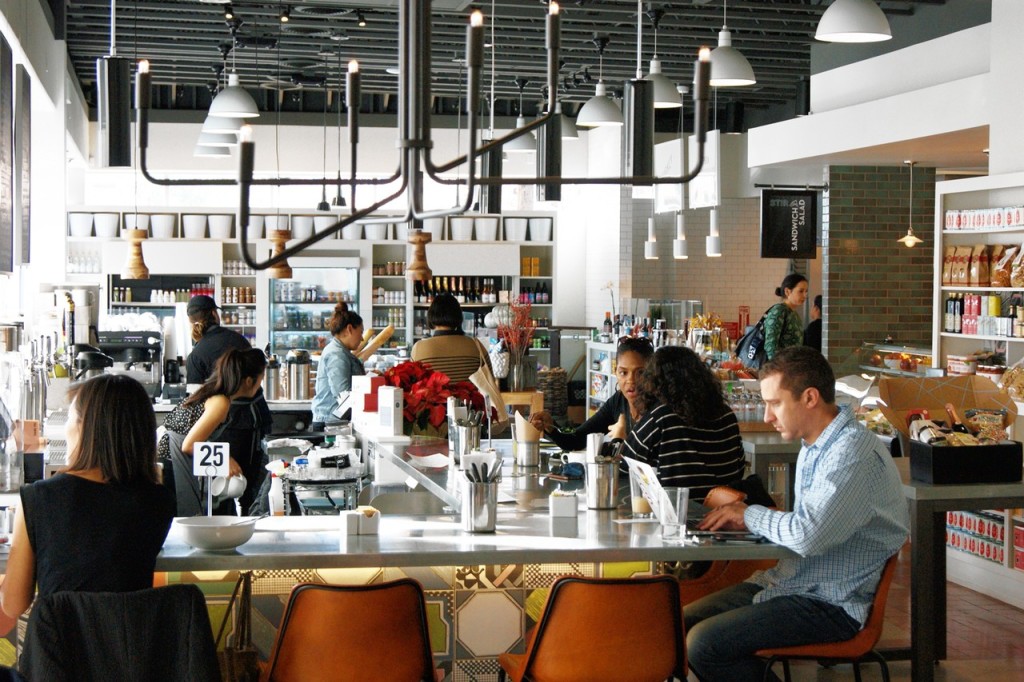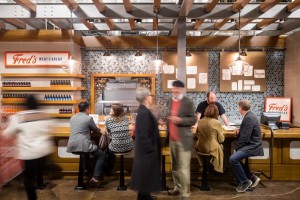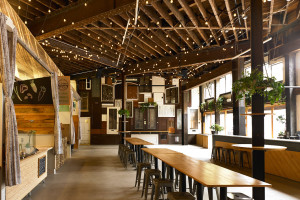
As anyone who has wandered the centuries-old epicurean aisles of Harrods in London or Le Bon Marché in Paris knows, food halls are not a new phenomenon. The emporiums, which traditionally occupied whole floors of department stores, have long offered European shoppers artisanal provisions such as pastries and cheeses, as well as prepared foods to eat on-site.
Here in the U.S., for years the closest facsimiles were shopping-mall food courts. Finally, though, American food halls are having their moment.
Like so many culinary trends—food trucks! gluten-free everything!—the craze has swept the country like a grease fire. Major cities have opened food halls in the past year, and more have them in the works. The operations range from smallish spaces to sprawling complexes; they may house a tiny collective of purveyors or a vast assemblage of merchants. Here are a few of the newest and best.
Gourmet to Go in Los Angeles
Stir Market, a relatively small (4,000-square-foot) hub, made its November debut in an industrial-loft-like space in L.A.’s Fairfax district—a historically Jewish neighborhood where kosher delis and bakeries are still common. Like a classic European food hall, Stir features a number of prepared-food stations. There’s a deli serving sandwiches like smoked-salmon BLTs, a bakery that offers fresh raisin babka and pain au chocolat, and a rotisserie station where Provençal roasted chicken and crispy porchetta are sliced to order. Founders include Food Network regular Jet Tila. 7475 Beverly Blvd., stirmarket.com
A Restaurant Roundup in Atlanta

This massive warehouse on the western side of Atlanta’s stately Inman Park neighborhood had several incarnations before it opened as Krog Street Market, an upscale food complex, in August. The space, which has 20-foot-high ceilings, was built in 1920 to house Atlanta Stove Works; it later served as headquarters for Tyler Perry Studios. It’s now occupied by 13 indie eateries and retail vendors, including the Luminary, a French brasserie helmed by Top Chef contestant Eli Kirshtein ; Grand Champion BBQ, which slings award-winning brisket, pulled pork and ribs; and the Little Tart Bakeshop, serving house-baked croissants, brioche and gougères. Many more are in the works. 99 Krog St., krogstreetmarket.com
A Secret Garden in New York
Just four blocks from perpetually mobbed Chelsea Market, Gansevoort Market is a 8,000-square-foot former warehouse with giant garage doors. The market opened in late October after a couple of false starts, and has a lineup of 21 vendors, including two outposts of East Village hot spots: Sushi Dojo Express (a spinoff of chef David Bouhadana ’s Sushi Dojo) and Ed’s Lobster Bar. There’s also a Bruffin Café, serving the brioche-muffin hybrid pastries that became a cult favorite at the Brooklyn food fair Smorgasburg; and a Tacombi taco bus (parked indoors, like the original version in the Nolita neighborhood). Purveyors of artisanal Greek yogurt, salumi and fresh juices are also camping out here. The real showstopper, though, is the central 60-seat dining area topped by a vaulted skylight and festooned with a forest of living bittersweet vines by landscape designer Charlie Baker. 52 Gansevoort St., gansmarket.com
Small Pleasures in San Francisco

For the past decade, Bay Area gourmands have been able to stock up at one of the country’s best-known collection of food vendors—the Ferry Building Marketplace. The Hall, which opened in September in a vacant billiards hall in the Mid-Market neighborhood, aims to provide something different. Call it a long-term pop-up; though the site is slated for eventual residential development, Hall co-founders Ted Wilson and Scott Peterson have a two-year lease for the space. They’ve filled it with outlets for six local purveyors whose small-scale operations (mostly street carts and food trucks) have already found success. Among them are Little Green Cyclo, a banh mi shop; Cassia, which sells Moroccan-Peruvian dishes such as meatball tagine and spiced sweet potatoes; and Raj & Singh, serving Indian curries, naan wraps and rice bowls. Other counters dish up artisanal gyros, sustainable seafood and baked goods. During the daily Happy Hour, a dim sum cart roams the space, selling bites from all six vendors for $5 each. To reinforce the communal vibe, the Hall also hosts weekly live music performances—and, in a bold departure for this tech-centric city, eschews Wi-Fi. 1028 Market St., thehallsf.com
Artisanal Eats in Denver
The Source opened just over a year ago in Denver’s artsy River North (RiNo) neighborhood. The sprawling, 25,000-square-foot brick building—an 1880s iron foundry—has 15 tenants, which run the gamut from a local flower and produce market (Beet & Yarrow) to full-service restaurants (Acorn, a wood-fired grill) to craft brewpubs (Crooked Stave Taproom, focusing on sour beers). What makes many of the outlets special, said Justin Croft, project manager for Zeppelin Development, which created the space, is “a hands-on quality that you don’t find at traditional eateries.” At Western Daughters butchery, for example, patrons can watch sides of beef being broken down; at Babettes Artisan Breads, bakers roll out baguette dough, and staffers at Boxcar Coffee Roasters pull beans from the company’s roaster, which dates from 1929. 3350 Brighton Blvd., thesourcedenver.com


